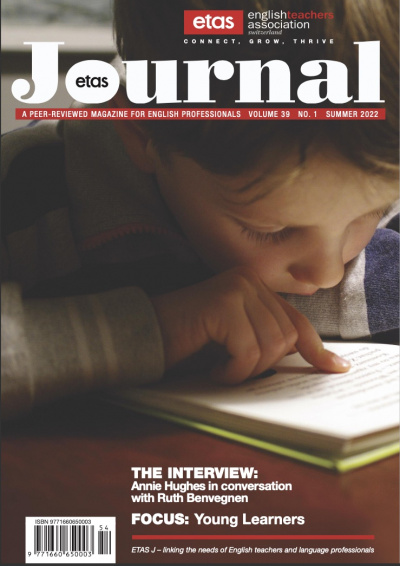Summer Journal 2022

Focus: Young Learners
It is with great pleasure that we present to you a superb selection of research, practice and reflections on the topic of teaching young learners. When we first started fielding ideas for this Focus, teaching English in the early years to primary school age children was only going to be considered – this is an English Language Teaching Journal after all! The more we discussed, however, the more it became apparent that educating our youngest learners is much more nuanced. We received an overwhelmingly positive response from young learner educators in Switzerland and around the world indicating that those working with this age group implement a more holistic approach within the methodology.
This is the first time in ten years that this topic has been covered and we hope that the growing number of ETAS members working with young learners will find the following pages inspiring and encouraging.
Table of Contents
6 President’s page
7 From the Editor’s desk
8 Call for articles
10 ETAS news: Join our team!
12 THE INTERVIEW Annie Hughes in conversation with Ruth Benvegnen
19 ASK ALEX …
FOCUS
17 How do young learners learn English? • Illya Arnet-Clark
20 What makes a good learner? Individual differences in early instructed language learning • Hansjakob Schneider/Raphael Berthele
22 From a social worker – Exploring and fostering pedagogical relationships • Martin Gebauer
24 What I learn with joy, I never forget: Research and practice coming together for a joyful teaching and learning experience • Dimitra Spyratou/Andrea Magee
26 Spiritual development in young children • Zia Ara
28 Reflections on teaching English to Special Educational Needs (SEN) children • Heidi Gallacher
29 “I’m the teacher!” “But I’m the native speaker!” Exploring the challenges that English native speakers bring to the EFL classroom • Sylvia Nadig
32 Diversity in the teenage classroom-whys and hows • Ilá Coimbra
34 Fostering student voice, choice, and autonomy in the foreign language classroom • Agnès Demornex
36 A formative day on the slopes: How your next skiing trip can inform your learner-centred practices • Kate Gregson
39 Catering for mixed-ability classes – Dealing with diversity inside the classroom • Susanna Schwab
42 Can difficulties be desirable in the primary classroom? • Dr Laura Loder Buechel
44 Take heart–try CLIL with art! Good practice for planning, implementing, and evaluating CLIL modules with heterogeneous young learners in mind • Silvia Frank Schmid
48 The benefits of using rhythmic texts in the young learner (YL) classroom • Ruth Benvengen
50 Learning in the time of Covid: A practical approach to using video in extended learning (or how I became a reluctant YouTube star) • Isabelle Thomas
52 Tell me a story about…Oral digital storytelling in the young learner classroom • Dr Andrea Lustenberger
56 Bringing “the world into the classroom”: Children’s and young adult literature in English language teaching • Michael Prusse
58 Creating and using sensory story sacks •Kate Hickmott
60 Literacy development in the early years Perspectives from Spain • Elena Soboleva
62 Best practice creative writing with Ross Sutherland -Writing about the moon • Ross Sutherland
64 But I DO know the word – just not in German! • Dr Laura Loder Buechel
66 Teaching teens tips! • Nikki Zünd
67 Seven teaching tips for young learners • Urs Kalberer
RESOURCES
68 Introduction to resources • Hannah McCulloch
74 AFTERCLASS • Geoff Tranter
Login to view PDF of Journal
Articles
On what students need
- Editor's Desk
